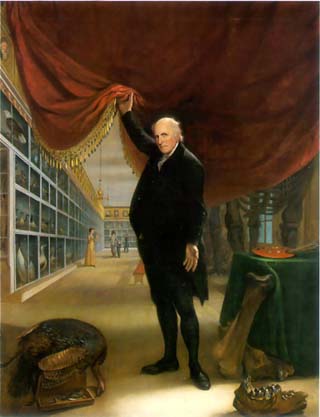
The Artist in His Museum. Oil on Canvas. (Image courtesy of wikipedia.org.)
Instructor(s)
Wyn Kelley
MIT Course Number
21L.705
As Taught In
Fall 2010
Level
Undergraduate
Course Description
Course Description
Global exploration in the eighteenth and nineteenth centuries radically changed Western science, orienting philosophies of natural history to more focused fields like comparative anatomy, botany, and geology. In the United States, European scientific advances and home-grown ventures like the Wilkes Exploring Expedition to Antarctica and the Pacific inspired new endeavors in cartography, ethnography, zoology, and evolutionary theory, replacing rigid models of thought and classification with more fluid and active systems. They inspired literary authors as well. This class will examine some of the most remarkable of these authors—Herman Melville (Moby-Dick and "The Encantadas"), Henry David Thoreau (Walden), Sarah Orne Jewett (Country of the Pointed Firs), Edith Wharton (House of Mirth), Toni Morrison (A Mercy), among others—in terms of the subjects and methods they adopted, imaginatively and often critically, from the natural sciences.
Other Versions
Other OCW Versions
OCW has published multiple versions of this subject. ![]()
- 21L.705 Major Authors: Old English and Beowulf (Spring 2014)
- 21L.705 Major Authors: Rewriting Genesis: "Paradise Lost" and Twentieth-Century Fantasy (Spring 2009)
- 21L.705 Major Authors: John Milton (Spring 2008)
- 21L.705 Major Authors: After the Masterpiece: Novels by Melville, Twain, Faulkner, and Morrison (Fall 2006)
- 21L.705 Masterworks in American Short Fiction (Fall 2005)
- 21L.705 Major Authors: Melville and Morrison (Fall 2003)
- 21L.705 Major Authors: Oscar Wilde and the '90's (Spring 2003)


